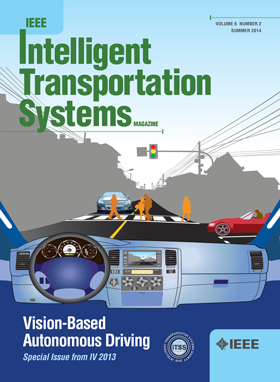面向未来车联网服务的基于许可区块链的量子边缘智能方法
IF 7.9
1区 工程技术
Q1 ENGINEERING, CIVIL
IEEE Transactions on Intelligent Transportation Systems
Pub Date : 2025-04-03
DOI:10.1109/TITS.2025.3553403
引用次数: 0
摘要
车联网(IoV)已成为未来网络系统的关键支柱。然而,密集的计算和任务卸载要求车辆竞争通信和计算资源,严重影响了系统的时间成本、鲁棒性和安全性。本文主要研究如何利用共享信息解决多车互联环境下的资源管理问题。我们使用时变马尔可夫决策过程对该问题进行建模,以解决车辆任务卸载中的挑战。创新在于解决不同的卸载场景,包括车对车、车对路边单元(RSU)、车对多址边缘计算(MAEC)服务器卸载和车对基站(BS)卸载。我们提出了一种量子启发的决斗深度q -学习(QDDQL)算法来开发边缘智能(EI)卸载策略。这种方法使车辆的任务卸载成为一个基于网络条件和用户状态的自动化步骤。MAEC服务器提供计算卸载服务,而基站可以将卸载任务提交给云区块链系统。这种创新的方法平衡了通信资源利用、计算资源利用和传输延迟。区块链技术保证了资源分配策略的透明性和安全性,通过共识机制防止边缘节点做出错误决策,从而提高资源分配的准确性、时效性和安全性。仿真结果表明,与现有方法相比,该方法能显著提高资源利用率、适应性和系统可扩展性,有效地解决了传统方法的缺陷。本文章由计算机程序翻译,如有差异,请以英文原文为准。
The Permissioned Blockchain-Based Quantum-Inspired Edge Intelligence Approach for the Services of Future Internet of Vehicles
The Internet of Vehicles (IoV) has become a key pillar in the future network system. However, intensive computing and task offloading required vehicles to compete for communication and computing resources, seriously affecting the systems time cost, robustness, and security. This paper focuses on solving resource management problems in the presence of interconnected multi-vehicles using shared information. We model this problem using a time-varying Markov decision process, addressing the challenges in task offloading for vehicles. The innovation lies in addressing different offloading scenarios, including vehicle-to-vehicle, vehicle-to-roadside unit (RSU) vehicle-to-multi-access edge computing (MAEC) server offloading, and vehicle-to-base station (BS). We propose a Quantum-inspired Dueling Deep Q-learning (QDDQL) algorithm to develop an Edge Intelligent (EI) offloading strategy. This method allows vehicles’ task offload to become an automated step based on network conditions and user status. The MAEC server offers computing offloading services, while the base station can submit offloading tasks to a cloud blockchain system. This innovative approach balances communication resource utilization, computational resource utilization, and transmission delay. Blockchain technology ensures transparency and security in resource allocation strategies, preventing edge nodes from making wrong decisions using consensus mechanism, and thereby improving the accuracy, timeliness, and security of resource allocation. Simulation results show that compared with existing methods, the proposed solution can significantly improve resource utilization, adaptability, and system scalability, and effectively address the defects of traditional methods.
求助全文
通过发布文献求助,成功后即可免费获取论文全文。
去求助
来源期刊

IEEE Transactions on Intelligent Transportation Systems
工程技术-工程:电子与电气
CiteScore
14.80
自引率
12.90%
发文量
1872
审稿时长
7.5 months
期刊介绍:
The theoretical, experimental and operational aspects of electrical and electronics engineering and information technologies as applied to Intelligent Transportation Systems (ITS). Intelligent Transportation Systems are defined as those systems utilizing synergistic technologies and systems engineering concepts to develop and improve transportation systems of all kinds. The scope of this interdisciplinary activity includes the promotion, consolidation and coordination of ITS technical activities among IEEE entities, and providing a focus for cooperative activities, both internally and externally.
 求助内容:
求助内容: 应助结果提醒方式:
应助结果提醒方式:


